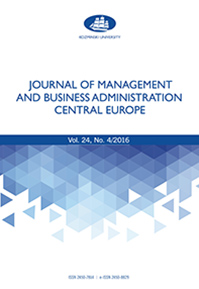Interdependence Among Creativity, Education,
and Job Experience: A Municipal Company in Poland
Interdependence Among Creativity, Education,
and Job Experience: A Municipal Company in Poland
Author(s): Marek JabłońskiSubject(s): Business Economy / Management
Published by: Akademia Leona Koźmińskiego
Keywords: creativity; experience; education; municipal company
Summary/Abstract: Purpose: The technological progress of production processes causes changes in the social structureof work, i.e. modifies the content of most, if not all, workplaces. In that respect, the identificationof changes in the intensity of creativeness, the level of education, and the experience of employeesin production processes and occupational tasks is a particularly important issue. The article investigates the interdependence among work creativity, education, and job experience of employees ofone of the municipal companies operating in Poland.Methodology: The study employs firm-level data covering over 2,200 observations. The study gathered data from three major internal sources of information: the scopes of responsibilities of organizational positions, personnel documentation regarding the individual level of education andprofessional experience, and the results of interviews with executive staff and employees on particular posts. The research proceedings base on document analysis, structured interviews, teamworkmethods, and a classification technique.Results: Research revealed that the complexity of work increased in the company. Jobs requiringhigher levels of creativity are occupied by employees with relatively higher education. However,their average level of education in the analyzed period decreased as opposed to jobs that requirerelatively lower levels of creativity. The analysis of interdependence between creativity and jobexperience identified that there emerged a relatively shorter average job experience for employeeswho perform cognitive work. Moreover, the average job experience increased in the group of employees who perform routine manual and non-routine cognitive work.Implications: The study refers to the job polarization issue by confirming the tendencies of labormarkets. It also addresses issues concerned with technological progress, although they are notconfirmed by research in this paper.Originality/Value: The main contribution of the paper is the interesting dataset gathered. Furthermore, the paper addresses an interesting question where empirical research at the firm level islacking, particularly municipal company
Journal: Central European Management Journal
- Issue Year: 27/2019
- Issue No: 4
- Page Range: 48-70
- Page Count: 23
- Language: English

